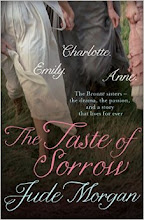Shirley Jackson, author of We Have Always Lived in the Castle, also wrote the book on which my favourite spooky film is based, that being the 1963 version of The Haunting of Hill House. I first saw that movie when I was about thirteen, and the scene where Claire Bloom and Julie Harris are in the bedroom while 'something' crashes past the door, trying the handle on its way, terrified me for years, while the film's closing line, "Here at Hill House, we all walk alone", chilled me to the marrow. The recent re-issue by Penguin Modern Classics of We Have Always Lived in the Castle, Jackson's last book, seems to have reawakened interest in the writer, and always one for an intriguing title, I greedily grabbed at a copy.
It's a book about which I could write either very little - simply, it's the story of two sisters and their Uncle, sequestered in the family house after the elder girl is acquitted of the poisoning of the rest of the family - or vast essays. I know very little about Jackson herself, but of the two stories of hers with which I am now familiar, it seems that she was deeply affected by the idea that people apart from the world can retreat into a house from which they do not, or cannot, escape. The house is simultaneously, in Jackson's books, refuge and prison. In both Hill House and ...Castle, the female protagonists, highly sensitive young women, become almost the blood, or internal organs, of the buildings they inhabit, and the house is a living entity into which the women are assimilated. There is a real fear evident in Jackson's work of the outside world, a need to be barricaded inside something solid, to cocoon oneself and to keep everyone and everything else out. We Have Always Lived in the Castle is an agoraphobic book, less supernatural than Hill House, but with essentially the same outcome.
Merricat is an alluring narrator. It becomes quickly evident that she is slightly mad, though in what way specifically, it is at first hard to say. There is a psychopathic edge to her thoughts, which, when combined with her evident childishness, is a tried-and-tested recipe for creepiness. The childish adult, or adult child, is a deeply unsettling stock character. Food, and mealtimes, are intrinsically important in the book, and are used to create an unhealthy mother-daughter relationship between the two sisters - Constance cooks for Merricat, they talk almost incessantly about food and what they will eat, they add jars of preserves to an already overflowing cellar...food seems to be the medium through which love is shown, but it is also the method by which murder is committed. Food then, as much as the house itself, is a controlling factor in the lives of these disturbing and disturbed young women.
Jackson does not answer many of the questions she sets up. There is a reveal which has already been guessed by the reader, but we never find out why Constance shields Merricat as she does, or indeed why Merricat is the way she is. The ending is oddly fairytale-esque; the house, or castle, becomes wrapped in vines, the girls themselves on the way to being no more than local myth, stories with which to scare children.
There is so much that one could say about this book; its themes range widely from those mentioned to analogies of adolescence and the repressed female as witch. There is humour in here, as dark as it may be, and there is a softness too, in the simple routines of Constance and Merricat, in their interaction, in the descriptions of the estate, its plants and animals and Uncle Julian. It is a short novel, but one which is much bigger than its component parts. It has traces of The Little Stranger, and of Grey Gardens, as well as the tortured youth of Carson McCullers' protagonists. It is a book I will revisit, definitely, and I think has the potential to become something of a cult classic. "I was chilled", as Merricat would say, but I would have to add, "in an entirely good way."
Subscribe to:
Post Comments (Atom)


1 comment:
I loved this book, like you I think it punches well above it's weight - for such a short book there is such a lot to think about. I really enoyed your analysis.
Post a Comment